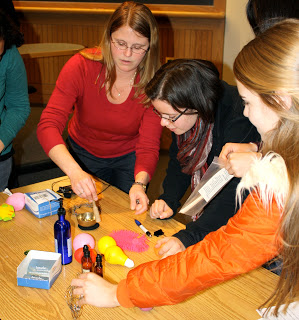Read a student's account of our most recent session in our Management Leadership and Development program below. For more information, about MLDP, click here.
This week’s MLDP Session was one that almost every Dartmouth student can relate to: stress and stress management. Most of us can probably relate more to the former than the latter, however after this week’s session, I can comfortably say all of the MLDP participants are feeling at least a little more empowered to take on their daunting task of surviving Midterm’s Week.
Kari Jo Grant currently works as the Health Education Coordinator at the Student Health Promotion & Wellness Office here at Dartmouth. She quickly made a point to let us know that their offices have recently moved from Dick’s House to 37 Dewey, right next to Dick’s House. Throughout the session, Kari Jo used a variety of reflective questions to help prompt the group about different stressors and stress-relievers in our lives. She began the session by asking us a simple, and yet somehow complicated, question: “What are some examples of good and bad stress?” While most of us could easily list more than enough examples of bad stress, we found it incredibly difficult to think of “good” stress. For most of us, myself included, stress carries a negative connotation. How could we be happily stressed? Some of us mentioned things such as exercise. While that fits the physiological definition of stress, Kari Jo quickly pointed out that for many individuals, exercise is a point of emotional stress, much like midterms are for the rest of us. All in all, we were left kind of stuck on the topic of “good stress.”
For the rest of the session, Kari Jo talked to us about symptoms of stress – difficulty sleeping, hyper-awareness of other’s emotions, fatigue, an inability to feel pleasure in the simple things. As she listed the symptoms, there was a quiet but steady murmur throughout the room as we all recognized the symptoms as fitting our lives all too well. We also discussed many of the stressor cues that allow us to realize we are stressed. These include things such as changes in appetite, body aches and pains, anxiety, and feeling out of control. We ended on a positive note, however, as Kari Jo showed us the Dartmouth website for Stress Management and Relaxation (see attached link), which contains several podcasts for meditation and relaxation. We all closed our eyes, breathed deep, and took a few quality minutes to let go. It was incredible realizing how almost everyone in the room truly benefited from the 8-10 min. of relaxation – I know I certainly did. One nap and stressball later (Kari was kind enough to bring some props with her to hand out!), I was ready to head to the dreaded Baker library where I worked away productively all night long on my upcoming midterm.
For more information about stress management, visit the Dartmouth Website for Relaxation here.
-Alyssa Perez '13
